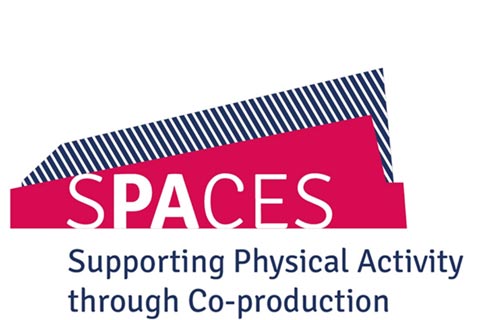Institute for Health and Care Improvement
Promoting and preserving
health and wellbeing
Research theme.
The work of this theme draws on a wide range of academic skills and disciplines.
Fundamental scientists investigate molecular and cellular mechanisms that underpin the development, diagnosis and treatment of disease. Applied researchers develop, evaluate and apply interventions to improve health and wellbeing. Together, our innovative work seeks to tackle the multiple issues facing health and social care in the UK today.
Our current projects include:
- SPACES: Supporting physical activity through co-production in people with severe mental illness
- Working Women and the Menopause
- Impact for Developmental Coordination Disorder (DCD) study
- CytoHealth – A study of the inflammatory response to exercise
- Patient-Based Disease Modelling using Pancreatic Cancer Organoids
SPACES: Supporting physical activity through co-production in people with severe mental illness

People with severe mental ill health (SMI) die on average 15-20 years prematurely, with over 70% of deaths attributed to preventable physical health conditions. Being physically active can reduce the risk of cardiovascular disease, diabetes and metabolic syndrome and improve mental wellbeing.
People with SMI report engaging in lower levels of physical activity and higher levels of sedentary behaviour than the general population and experience several unique barriers to engaging in physical activity. These barriers include cost, availability, lack of social support and low motivation among several others.
The SPACES research project - Supporting Physical Activity through Co-production in people with Severe Mental Illness - aims to address this issue by developing and evaluating an intervention to increase physical activity among people with SMI.
SPACES is an ongoing 6-year multi-site programme of research funded by the NIHR with co-production at its core. People with SMI have collaborated with the research team at all stages, from developing the research question all the way through to steering the design of the SPACES intervention.
For further information read this On Medicine blog post or contact Professor Garry Tew.
Working Women and the Menopause

All women are affected by the menopause during their life. Its impact on health, wellbeing and mood can be significant, yet it is largely overlooked in conversations and policies on employee wellness and support. This reflects a wider, disproportionate focus on male experiences at work across research and in wider debate.
As an experience that affects all women, isn't it time we took a more mature and proactive approach to understanding the menopause and considering the support that women might value from their employer during that period of their lives? The University's Institute for Social Justice has funded a new, year-long study to explore the experiences of menopausal women and determine what we need to learn and consider, to improve provision for the menopause in the workplace.
For further information contact Dr Sophie Carter.
Impact for Developmental Coordination Disorder (DCD) study

Learning to walk, talk, eat with utensils, run and play are important skills we acquire during childhood. Unfortunately, for some children, they are not always learnt with ease. When a child does experience significant difficulty which impacts the acquisition of many movement skills and persists over an extended period of time, they are often referred to as having motor planning difficulties, motor dyspraxia, and sometimes a condition medically diagnosed as Developmental Coordination Disorder (DCD).
In 2020, an Australian research group carried out one of the largest surveys conducted in the world to identify the challenges experienced by children with DCD and their families. The responses revealed that families experience significant challenges overall and more so for obtaining a diagnosis for their child's movement problems and thereafter receiving support and recognition. Responses from the families also identified the significant impact that DCD has in daily life including the social and emotional aspects of a child life.
However, we know very little about the challenges and magnitude of the problems experienced by families having children with DCD in the UK. Following on the Australian study there was a clear need for this survey to be replicated in the UK. Led by Dr Charikleia Sinani, UK researchers and allied health professionals, together in collaboration with Australian researchers in conjunction with DCD UK this project aims were two-fold: to understand the scale and breadth of issues experienced in DCD, and to identify and prioritise the areas in which children with DCD and their families require support.
Find out more on the Dyspraxia Foundation website: Impact DCD Study.
You can also learn more on the Impact DCD survey page.
CytoHealth - a study of the inflammatory response to exercise
This project will examine changes in the expression of 26 cytokines and chemokines after a maximal exercise test in healthy volunteers. This information will be used understand the ‘normal response’ and to design further research to examine how it compares to patients undergoing major abdominal surgery, who have underlying pathology, and if these changes relate to patient outcomes.
The project is funded by an Elsie May Sykes Research Award. The lead site and sponsor is York and Scarborough Teaching Hospitals NHS Foundation Trust. The study assessment sessions will be conducted at York St John University and blood samples will be analysed at the University of York. The research team at York St John University includes Professor Garry Tew, Dr Sophie Carter, and Dr Adam Odell.
Patient-based Disease Modelling using Pancreatic Cancer Organoids
Pancreatic cancer is a complex disease that has the worst prognosis of all the main cancer types in the UK, with only 8% of patients currently surviving 5 years after diagnosis. This is in part due to late-stage presentation, but also because the cancers are resistant to standard chemotherapy treatments. These factors mean that research into improved detection and treatment of pancreatic cancers is of particular importance.
Our project will build a clinically-relevant research resource that will form the basis of future investigations into novel and effective pancreatic cancer treatment. Donated tissue from pancreatic cancer patients will be collected immediately after surgery, and treated to generate organoids – complex cellular models grown inside a laboratory that accurately represent the patient’s disease characteristics. These organoids will be preserved as a living biobank that will display a broad range of pancreatic cancer characteristics, and can be used for investigating how to detect the cancer cells, and methods of improving the efficacy of chemotherapy.
Cellular models commonly used in translational research are unable to recapitulate the complexity of interactions between tumours and their microenvironment. These interactions have a profound influence on treatment response, the development of resistance over time, and ultimately, survival of patients. Hence there is an urgent need to establish and use improved models of primary cancer in laboratory investigations.
Our pancreatic cancer biobank will enable us to recruit a team of talented researchers dedicated to uncovering exploitable vulnerabilities within the entire tumour microenvironment, to understand how tumours adapt to overcome first line treatment, and translate these findings into the clinic.
